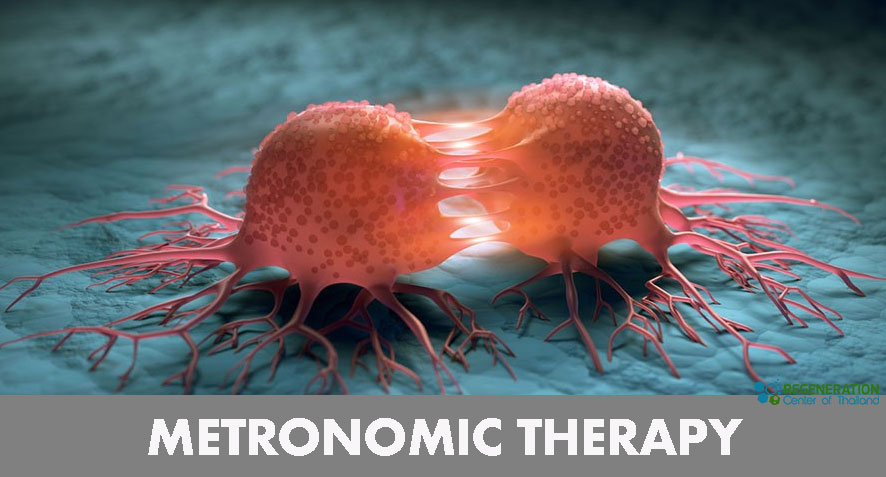Metronomic therapy refers to the administration of low, continuous, and regular doses of certain drugs (often chemotherapeutic agents) without extended rest periods. This dosing strategy stands in contrast to the more traditional “maximum-tolerated dose” approach, where high doses of chemotherapy are given with intervening rest periods to allow for patient recovery from side effects.
Features and benefits of metronomic chemotherapy:
- Anti-Angiogenic Effect: One of the primary mechanisms of metronomic chemotherapy is its anti-angiogenic effect. Angiogenesis is the process by which new blood vessels form from pre-existing vessels. Tumors need angiogenesis to grow and metastasize, as they require a supply of oxygen and nutrients from the blood. Continuous low-dose therapy can inhibit this process, starving the tumor of its needed blood supply.
- Immunomodulatory Effects: Some studies suggest that metronomic dosing can modulate the immune response, potentially enhancing the body’s ability to recognize and NK Cells to destroy cancer cells.
- Potentially Fewer Side Effects: Because the drugs are administered in low doses, the severe side effects often seen with standard chemotherapy regimens might be reduced.
- Drug Resistance: The approach may help in delaying or circumventing the development of drug resistance, a common problem in cancer therapy.
- Cost-Effectiveness: Many of the drugs used in metronomic therapy are off-patent and may be more affordable than newer targeted therapies or immunotherapies.
- Versatility: It can be combined with other therapeutic strategies, including traditional chemotherapy, targeted therapies, radiation, and immunotherapy, offering a multi-pronged approach to cancer treatment.
However, it’s important to note that while metronomic therapy offers several potential advantages, it’s not suitable for all cancer types or all patients. The optimal dosing, choice of drug, and patient selection criteria are still areas of active research.
As always, decisions regarding cancer treatment should be made in close consultation with a knowledgeable oncologist, considering the individual patient’s type of cancer, stage, overall health, and other factors. Metronomic therapy offers an alternative salvage treatment for patients who have been heavily pre-treated relapsed/refractory multiple myeloma, kidney cancer, liver cancer, lung cancer, pancreatic cancer, and cancer of the prostate. Metronomic therapy has been shown to affect both tumor cells & tumor microenvironment to achieve therapeutic effects. Metronomic cancer therapy is also considered a lower cost dose used compared to conventional chemotherapy and NK Cell treatments.
Metronomic therapy vs conventional chemotherapy
In conventional cancer chemotherapy, a near maximum dose is administered to achieve cytotoxic effects on existing tumor cells. This approach can be successful, however, the side effects are often very significant. The Cytotoxic agents in therapies also rapidly kill all fast-dividing cells in the body, including epithelial cells, mesenchymal cells, bone marrow cells and damage to the gastrointestinal tract. Patients often need treatment breaks to allow recovery of some of the damaged functions and tissues.
In comparison, metronomic therapy, uses lower dosages (one-tenth to one-third ) of standard dose. This allows more frequent sessions using low concentrations of the medications in the blood plasma. Metronomic therapy medications are commonly given in oral form and is cheaper compared with intravenous injections used in conventional chemotherapy. At a low concentrations, the metronomic drugs primarily act on the tumor microenvironment, immune cells & tumor endothelial cells. Since patients need lower dosages the risk of having adverse side effects is often much lower.

